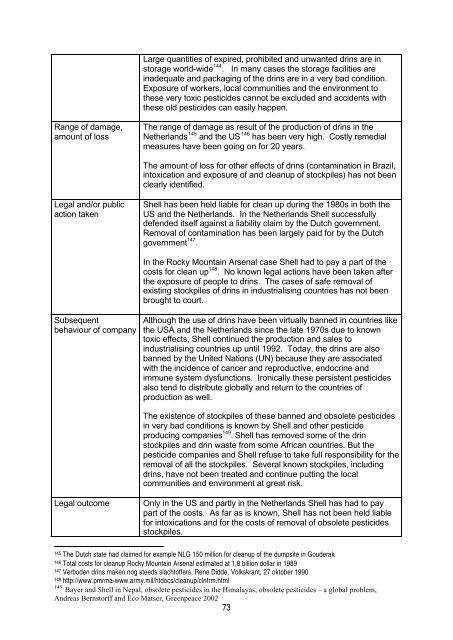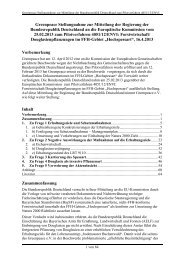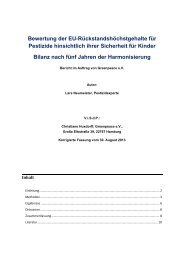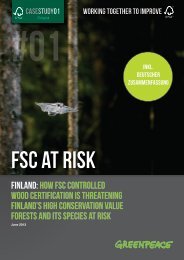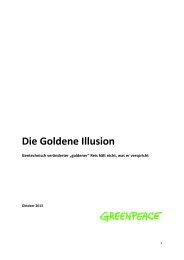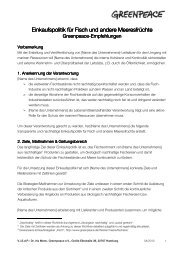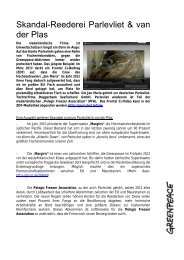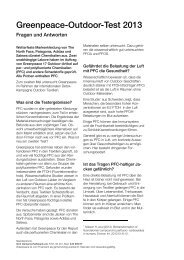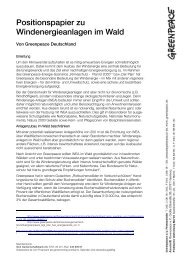Umweltverbrechen multinationaler Konzerne - Greenpeace
Umweltverbrechen multinationaler Konzerne - Greenpeace
Umweltverbrechen multinationaler Konzerne - Greenpeace
Erfolgreiche ePaper selbst erstellen
Machen Sie aus Ihren PDF Publikationen ein blätterbares Flipbook mit unserer einzigartigen Google optimierten e-Paper Software.
Range of damage,<br />
amount of loss<br />
Legal and/or public<br />
action taken<br />
Subsequent<br />
behaviour of company<br />
Large quantities of expired, prohibited and unwanted drins are in<br />
storage world-wide 144 . In many cases the storage facilities are<br />
inadequate and packaging of the drins are in a very bad condition.<br />
Exposure of workers, local communities and the environment to<br />
these very toxic pesticides cannot be excluded and accidents with<br />
these old pesticides can easily happen.<br />
The range of damage as result of the production of drins in the<br />
Netherlands 145 and the US 146 has been very high. Costly remedial<br />
measures have been going on for 20 years.<br />
The amount of loss for other effects of drins (contamination in Brazil,<br />
intoxication and exposure of and cleanup of stockpiles) has not been<br />
clearly identified.<br />
Shell has been held liable for clean up during the 1980s in both the<br />
US and the Netherlands. In the Netherlands Shell successfully<br />
defended itself against a liability claim by the Dutch government.<br />
Removal of contamination has been largely paid for by the Dutch<br />
government 147 .<br />
In the Rocky Mountain Arsenal case Shell had to pay a part of the<br />
costs for clean up 148 . No known legal actions have been taken after<br />
the exposure of people to drins. The cases of safe removal of<br />
existing stockpiles of drins in industrialising countries has not been<br />
brought to court.<br />
Although the use of drins have been virtually banned in countries like<br />
the USA and the Netherlands since the late 1970s due to known<br />
toxic effects, Shell continued the production and sales to<br />
industrialising countries up until 1992. Today, the drins are also<br />
banned by the United Nations (UN) because they are associated<br />
with the incidence of cancer and reproductive, endocrine and<br />
immune system dysfunctions. Ironically these persistent pesticides<br />
also tend to distribute globally and return to the countries of<br />
production as well.<br />
The existence of stockpiles of these banned and obsolete pesticides<br />
in very bad conditions is known by Shell and other pesticide<br />
producing companies 149 . Shell has removed some of the drin<br />
stockpiles and drin waste from some African countries. But the<br />
pesticide companies and Shell refuse to take full responsibility for the<br />
removal of all the stockpiles. Several known stockpiles, including<br />
drins, have not been treated and continue putting the local<br />
communities and environment at great risk.<br />
Legal outcome Only in the US and partly in the Netherlands Shell has had to pay<br />
part of the costs. As far as is known, Shell has not been held liable<br />
for intoxications and for the costs of removal of obsolete pesticides<br />
stockpiles.<br />
145 The Dutch state had claimed for example NLG 150 million for cleanup of the dumpsite in Gouderak<br />
146 Total costs for cleanup Rocky Mountain Arsenal estimated at 1,8 billion dollar in 1989<br />
147 Verboden drins maken nog steeds slachtoffers, Rene Didde, Volkskrant, 27 oktober 1990<br />
148 http://www.pmrma-www.army.mil/htdocs/cleanup/clnfrm.html<br />
149<br />
Bayer and Shell in Nepal, obsolete pesticides in the Himalayas, obsolete pesticides – a global problem,<br />
Andreas Bernstorff and Eco Matser, <strong>Greenpeace</strong> 2002<br />
73


